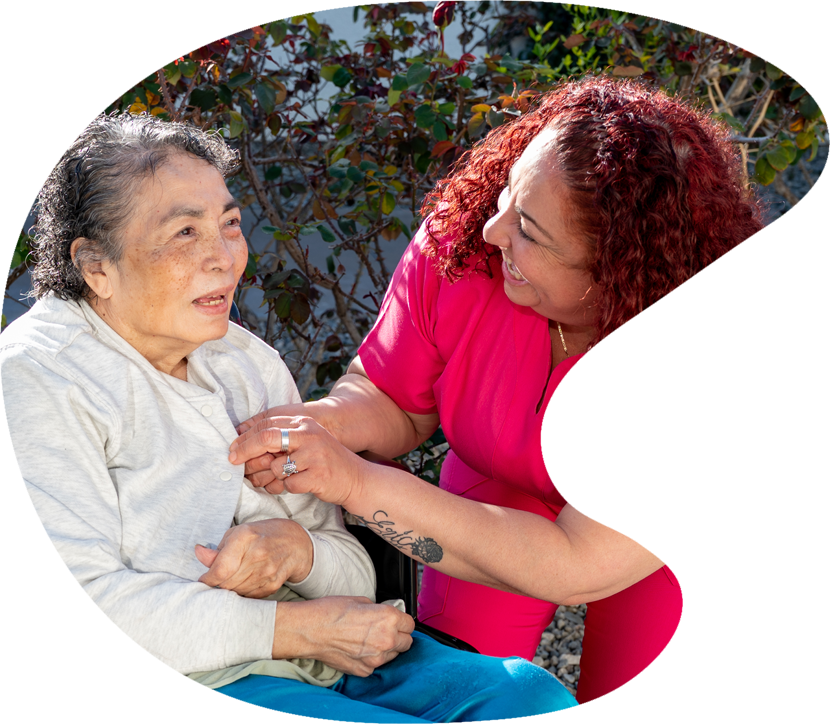
Students who enroll in our IHSS Emergency and Disaster Readiness (EDR) training for caregivers will learn how to handle emergencies.
This caregiver training provides information on wildfires and other climate-related emergencies or natural disasters that impact caregivers and the people they care for.
Students will receive training in emergency planning, safe evacuation and sheltering, emergency communication, stress management, and disaster psychology to help manage emergency-related trauma.
The EDR course is offered to IHSS Providers in California in select counties, as follows:
San Bernardino County
Our EDR course is offered in San Bernardino County, California, with the SB County Public Authority, our partner in a special IHSS caregiver training program.
Format: Instructor-led via Zoom
Duration: 6 weeks, once per week for 2.5 hours
Language: English and Spanish
Stipend: We may pay you after course completion.
Eligibility Requirements:
- Active IHSS Provider
- The care recipient lives in San Bernardino County and is enrolled in the IHSS program
Enrollment for the San Bernardino program opened in January 2026, and classes begin in March 2026.
Sign up for this course in SB County by clicking a button below to access the enrollment form in your language:
San Francisco, San Mateo, and Santa Clara Counties
Our EDR course is offered in these Northern California counties with our partners in the “Pathways to Professionalization for IHSS Workers” Program:
Format: Self-paced e-Learning
Duration: 6 modules, approximately 15 hours
Languages: English, Spanish, and Cantonese
Stipend: We may pay you after program completion.
Northern California IHSS Provider Requirements:
- Active IHSS Provider who lives in select counties
- The care recipient lives in select counties
If you have questions about the EDR Course, email us at:
studentaffairs@advancecaregivers.org
Enrollment for the Northern California program opened in October 2025, and classes begin in February 2026. Sign up for this course by clicking a button below to access the enrollment form in your language:
Los Angeles County
Our EDR course is offered in Los Angeles County with LA2050, our partner in a special LA community grant program. The EDR course in LA is fully enrolled. We have no more openings in Los Angeles.
Format: Self-paced e-Learning
Duration: 6 modules, approximately 15 hours
Languages: English
Stipend: We may pay you after program completion.
Los Angeles County IHSS Provider Requirements:
- Active IHSS Provider who lives in Los Angeles County
- The care recipient lives in Los Angeles County
Enrollment for the Los Angeles program opened in January 2026, and classes begin in March 2026.
This EDR course in Los Angeles County is full. We cannot accept more students for this location.
All Other Counties
If you don’t reside in the counties listed above, but are interested in the EDR course, please click the button below to submit an “interest form.” We may be able to expand these caregiver training classes into other counties in California if there is enough interest.
If you have questions about the EDR Course, email us at:
studentaffairs@advancecaregivers.org
Here is what you will learn in the EDR course:
Module 1: Climate Change and Its Connection to Care
In this Emergency and Disaster Readiness (EDR) caregiver training module, you will learn the roles and responsibilities of caregivers. In addition, you will be introduced to five enhanced roles of the caregiver on the care team – monitor, coach, communicator, navigator, and care aide; as well as four key skills while support role enhancement – observe, monitor, document, and report. Methods of identifying health plan information and appropriate documentation and reporting of consumer behavior changes will also be discussed.
Module 2: Vulnerability, Disproportionate Impact, and Environmental Justice
This module will explain social determinants of health and identify communities that have greater vulnerability to climate impacts. Exposure, sensitivity, and adaptive capacity as predictors of vulnerability will be covered. The module will conclude with a discussion on environmental justice.
Module 3: Community Resilience and Emergency Planning
This module discusses community resilience and how it contributes to climate adaptation. Emergency preparedness will be examined, including identifying local resources and integrating individuals with access and functional needs into emergency plans. Emergency preparedness will be further explored in this unit by identifying which items should be included in emergency kits and the types of “Go Bags” that are needed to support individuals, including those with disabilities, during climate-related emergencies.
Module 4: Protective Actions for Climate-Related Emergencies
This module will discuss protective actions that should be taken during climate-related emergencies and how to prevent and address injuries related to extreme heat exposure. You will also learn proper techniques that help move someone who is unable to walk due to injury or ability, or is bed-bound, during a climate-related emergency.
Module 5: Responding to Climate-Related Emergencies and Communication
This module will discuss how to identify the physical and psychological signs of trauma. You will also learn ways to manage the emotional impact of traumatic climate-related emergencies and how to apply person-centered concepts and skills that support survivors of trauma. We will review secondary trauma and self-care strategies to enhance a caregiver’s own resilience, along with demonstrating the proper use of reflective listening.
Module 6: Post-Climate Related Emergency Trauma
This module will discuss strategies, using a resiliency framework, to expand IHSS workers’ skills in their roles as essential workers and first responders during emergencies and climate-driven disasters. The goal will be preparing IHSS workers with the skills and specialized training to prepare for, respond to, and recover from emergencies, in their capacity and specific role as both essential workers and first responders on behalf of those in their care that reside in high pollution communities.

